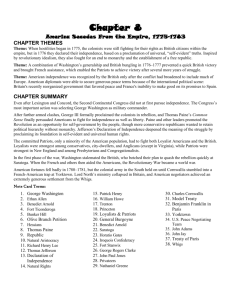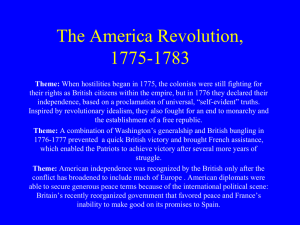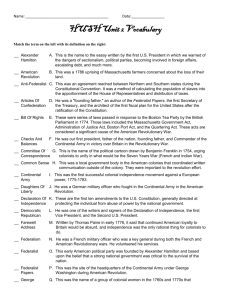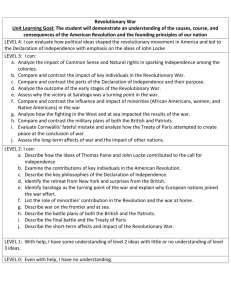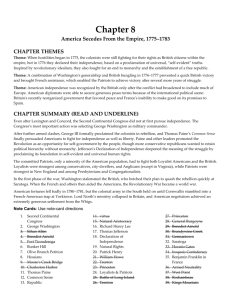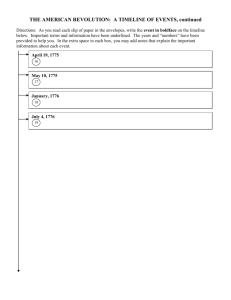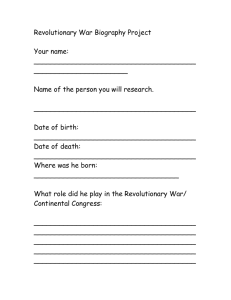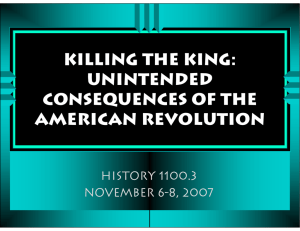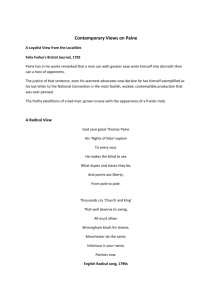character sketches - apush
advertisement
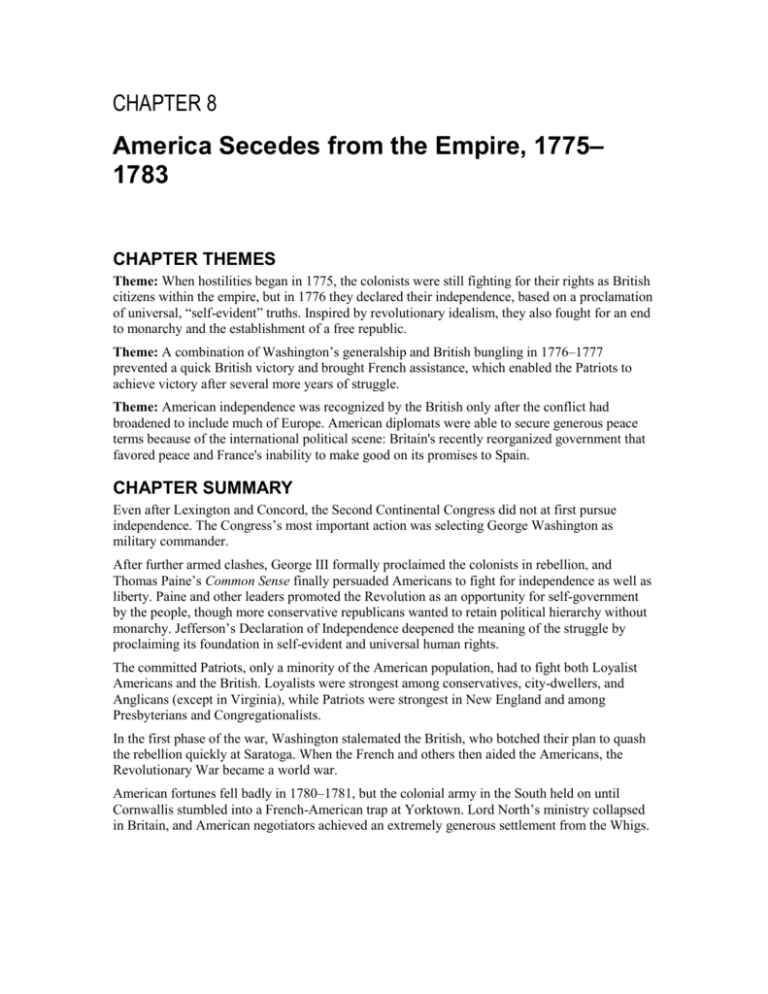
CHAPTER 8 America Secedes from the Empire, 1775– 1783 CHAPTER THEMES Theme: When hostilities began in 1775, the colonists were still fighting for their rights as British citizens within the empire, but in 1776 they declared their independence, based on a proclamation of universal, “self-evident” truths. Inspired by revolutionary idealism, they also fought for an end to monarchy and the establishment of a free republic. Theme: A combination of Washington’s generalship and British bungling in 1776–1777 prevented a quick British victory and brought French assistance, which enabled the Patriots to achieve victory after several more years of struggle. Theme: American independence was recognized by the British only after the conflict had broadened to include much of Europe. American diplomats were able to secure generous peace terms because of the international political scene: Britain's recently reorganized government that favored peace and France's inability to make good on its promises to Spain. CHAPTER SUMMARY Even after Lexington and Concord, the Second Continental Congress did not at first pursue independence. The Congress’s most important action was selecting George Washington as military commander. After further armed clashes, George III formally proclaimed the colonists in rebellion, and Thomas Paine’s Common Sense finally persuaded Americans to fight for independence as well as liberty. Paine and other leaders promoted the Revolution as an opportunity for self-government by the people, though more conservative republicans wanted to retain political hierarchy without monarchy. Jefferson’s Declaration of Independence deepened the meaning of the struggle by proclaiming its foundation in self-evident and universal human rights. The committed Patriots, only a minority of the American population, had to fight both Loyalist Americans and the British. Loyalists were strongest among conservatives, city-dwellers, and Anglicans (except in Virginia), while Patriots were strongest in New England and among Presbyterians and Congregationalists. In the first phase of the war, Washington stalemated the British, who botched their plan to quash the rebellion quickly at Saratoga. When the French and others then aided the Americans, the Revolutionary War became a world war. American fortunes fell badly in 1780–1781, but the colonial army in the South held on until Cornwallis stumbled into a French-American trap at Yorktown. Lord North’s ministry collapsed in Britain, and American negotiators achieved an extremely generous settlement from the Whigs. CHARACTER SKETCHES CHAPTER 8 - APUS – MR. BUNNER Thomas Paine (1737–1809) Paine’s Revolutionary propaganda in Common Sense and the Crisis played a critical role in arousing American patriotism. Because of his later role in the French Revolution, and especially his attacks on Christianity in The Age of Reason, Paine has long been the most controversial of the Revolutionary heroes. Theodore Roosevelt, for instance, once called him a “dirty little atheist.” After the American Revolution Paine traveled to Britain and France to promote his iron-bridge invention. He became a French citizen and was elected to the Revolutionary Convention. His stirring work, The Rights of Man, a reply to Edmund Burke’s Reflections on the Revolution in France, sold hundreds of thousands of copies and made him a wanted man in Britain. Following his return to America in 1801, even his influential friends, like Jefferson, avoided him, and he ended his life in poverty. After his death a British admirer dug up his bones and shipped them to Britain, where they were lost. Quote: “One of the strongest natural proofs of the folly of hereditary right in kings is that nature disapproves it, otherwise she would not so frequently turn it into ridicule by giving mankind an Ass for a Lion.…But where, some say, is the King of America? I’ll tell you, friend, He reigns above, and doth not make havoc of mankind like the Royal Brute of Great Britain.” (Common Sense, 1776) Richard Henry Lee (1732–1794) Richard Henry Lee, the most eloquent Revolutionary orator besides Patrick Henry, was the author of the resolution declaring independence in June of 1776. Lee came from the wealthy and influential Virginia Lee clan. Along with Henry, he gained political influence with his speeches attacking the Stamp Act and British economic domination of the colonies. He was a commanding presence at the Philadelphia Congress; John Adams was awed by him and called him a “masterly man.” His brother, Francis Lightfoot Lee, also signed the Declaration of Independence. His career declined after the Revolution, and like Henry, he was an Anti-Federalist in the fight over the Constitution. Tall and slender, Lee had receding red hair and a musical voice. Quote: “Why then do we longer delay? Why still deliberate? Let this most happy day give birth to the American republic. Let her arise, not to devastate and conquer, but to re-establish the reign of peace and law.” (Speech to Second Continental Congress, 1776) John Paul Jones (1742–1792) A naval hero of the American Revolution, Jones is known as the founder of the United States Navy. Although he professed deep commitment to America, he was a Scottish immigrant who actually spent little time in the United States, preferring to live abroad after the Revolution. His original name was John Paul. He added the “Jones” in 1773, evidently to conceal his identity after being accused of killing a mutineer aboard a British merchant ship he was commanding. He then came to Virginia, made influential friends like Robert Morris, and received authorization to begin a navy. The heroic fight when he lashed the Serapis to his Bonhomme Richard made him an international hero, although in Britain he was considered a pirate because of his raids on coastal towns. An extremely complex personality, Jones has puzzled historians and has often been the subject of novels, plays, and poems. Despite his service to America’s republican cause, he was devoted to King Louis XIV of France and near the end of his life became an officer in the navy of the despotic czarina of Russia, Catherine II. Quote: “America has been the country of my fond election, from the age of thirteen, when I first saw it. I had the honor to hoist, with my hands, the flag of freedom, the first time it was displayed on the River Delaware; and I have attended it, with veneration, ever since on the ocean.” (1779) George Rogers Clark (1752–1818) Clark was the American frontiersman whose daring exploits won the trans-Appalachian west for the new United States. Born in Virginia, Clark went west at age nineteen to work as a surveyor along the Ohio River. Clark became a leader of the frontier settlers, who deeply resented the British authorities’ connections with Indians. Clark returned to Virginia in 1776 to receive a militia commission to attack British forts. He hoped to raise at least 500 men, but only 175 joined him. After his great successes in the Illinois campaign and the capture of Vincennes, he attempted to capture the British fort at Detroit in 1779 but failed. Besides his skill at frontier warfare, he proved especially adept at persuading many Indians to abandon the British and support the French and Americans, or at least to remain neutral. He had little success after the war. Jefferson initially offered him command of the expedition to explore Louisiana, but the position went instead to his brother William. Quote: “The Great Spirit has caused your old Father the French King and other nations to join the big Knife (Washington) and fight with them, so that the English have become like a deer in the woods.”
